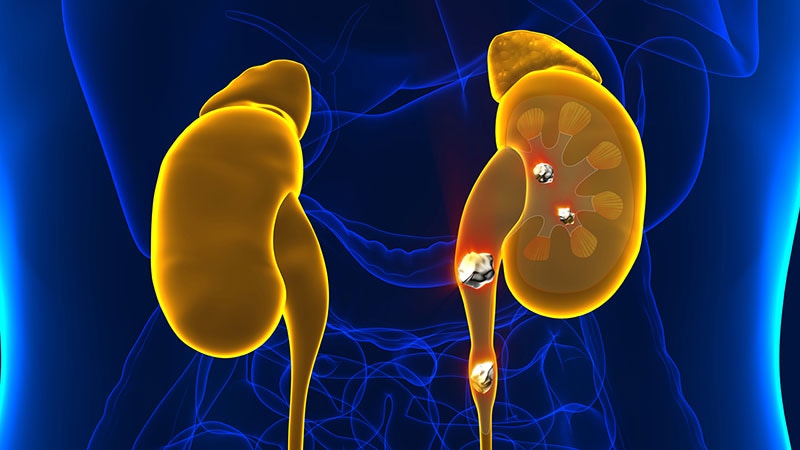Belangrijkste concepten
Gut and urinary microbiota alterations are crucial in preventing kidney stones by avoiding modulators like poor diet and antibiotics.
Samenvatting
TOPLINE:
- Gut and urinary microbiota changes are significant in kidney stone development.
- Focus should shift to systems-level microbial imbalances rather than specific gut bacteria.
METHODOLOGY:
- Studied gut, urinary, and oral microbiota of 83 kidney stone patients and 30 healthy controls.
- Used shotgun metagenomic sequencing to identify specific gut bacteria and genetic capabilities.
TAKEAWAY:
- Disturbances in microbiota observed in all three microbiomes of kidney stone formers.
- Patients with kidney stones had more antibiotic-resistant genes and reduced diversity.
IN PRACTICE:
- Unhealthy microbiome and antibiotic resistance seen in kidney stone patients.
- Treatment should focus on microbial restoration and avoiding poor diet and antibiotics.
SOURCE:
- Study published in Microbiome on November 25, 2023.
LIMITATIONS:
- Sampling techniques provide relative compositional information.
- Causality of stone disease cannot be established due to the observational nature of the study.
Samenvatting aanpassen
Herschrijven met AI
Citaten genereren
Bron vertalen
Naar een andere taal
Mindmap genereren
vanuit de broninhoud
Bron bekijken
www.medscape.com
Can a Healthy Gut Microbiome Prevent Kidney Stones?
Statistieken
Patients had no antibiotic exposure within the previous 90 days.
Patients who formed kidney stones showed more antibiotic-resistant genes.
Those with kidney stones had reduced taxonomic and functional diversity compared with healthy controls.
Citaten
"We found not only that those who got kidney stones had an unhealthy microbiome, including a gut microbiome that was more likely to excrete toxins to the kidneys, but also that they were antibiotic resistant."
Belangrijkste Inzichten Gedestilleerd Uit
by Nancy A. Mel... om www.medscape.com 12-22-2023
https://www.medscape.com/viewarticle/can-healthy-gut-microbiome-prevent-kidney-stones-2023a1000weq
Diepere vragen
How can the findings of this study impact the treatment of kidney stone patients?
The findings of this study suggest that focusing on microbial restoration and avoiding factors like poor diet and antibiotic use could be crucial in preventing kidney stone recurrence. By understanding the role of gut and urinary microbiota in kidney stone formation, healthcare providers may consider interventions that target restoring microbial balance in patients with kidney stones. This could involve personalized dietary recommendations, probiotic supplementation, or even targeted antimicrobial therapies to address specific microbial imbalances associated with kidney stone formation.
What are the potential drawbacks of focusing on microbial restoration in kidney stone prevention?
While focusing on microbial restoration shows promise in preventing kidney stones, there are potential drawbacks to consider. One limitation is the complexity of the microbiome and the individual variability in microbial composition among patients. Implementing microbial restoration strategies may not have universal effectiveness due to the personalized nature of microbiota. Additionally, interventions aimed at altering the microbiome may have unintended consequences on overall health, as the microbiome plays a role in various physiological functions beyond kidney stone formation. Furthermore, the long-term effects and sustainability of microbial restoration interventions in preventing kidney stones need further research to assess their efficacy and safety.
How can the study's emphasis on microbial imbalances be applied to other medical conditions?
The study's emphasis on microbial imbalances in kidney stone formation can be applied to other medical conditions that are influenced by the microbiome. Understanding the role of microbial dysbiosis in disease pathogenesis can lead to novel therapeutic approaches targeting the microbiome. For example, conditions like inflammatory bowel disease, obesity, and even mental health disorders have been linked to alterations in the gut microbiota. By investigating and addressing microbial imbalances in these conditions, researchers and healthcare providers can develop targeted interventions such as probiotics, prebiotics, or fecal microbiota transplantation to restore microbial balance and potentially improve patient outcomes. This systems-level approach to understanding disease mechanisms through the lens of the microbiome could pave the way for innovative treatments across various medical conditions.
0
